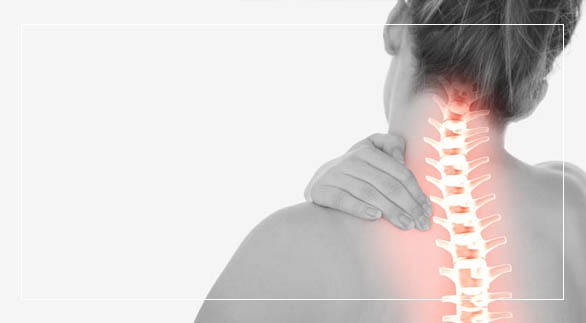Cervical Spondylosis
Cervical spondylosis or cervical or neck osteoarthritis is a condition that occurs when there are some changes in the bones, discs, and joints of the neck. These are originated by the regular wear-and-tear of cartilage and bone. The discs of the cervical spine (in the neck) slowly break down, lose fluid, and become stiffer with age. It is usually observed in middle-aged and older people.
Contact Dr. Amit Bindal, the best spine surgeon in Meerut, for the best treatment for cervical spondylosis.
Cervical spondylosis causes
Potential causes of the Cervical spondylosis include:
- Bone spurs
- Dehydrated spinal discs
- Herniated discs
- Neck Injury
- Ligament stiffness
- Extra pressure on the spine due to repetitive movements or heavy lifting (such as construction work).
- keeping your neck in a troublesome position for long periods of repetitive stress.
- genetic factors
- smoking
- being overweight and inactive

spondylosis symptoms of cervical spondylosis myelopathy treatment may include one or more of the following:
- Neck pain and stiffness
- Headache originating from neck or back pain treatment
- shoulder or arms pain
- Inability to turn the head entirely or bend the neck
- tingling or numbness in shoulders, arms or legs
- Pain around the shoulder blade.
- Muscle weakness.
- Lack of coordination and difficulty in moving
- Irregular reflexes
- Muscle spasms
- Uncontrolled bladder and bowel
When to see a doctor
If you have an abrupt commencement of insensitivity or prickling in the shoulder, hands, or legs, or when you lose bowel or bladder control, consult your doctor immediately.
If your pain and discomfort begin to interfere with your daily activities, seek medical help.
Testing for and diagnosing the condition
- Making a diagnosis of cervical spondylosis requires ruling out other potential conditions, such as fibromyalgia.
- It also needs testing for movement and determining the affected nerves, bones, and muscles.
- Physical exam
- Tests to check your reflexes, muscle weakness, or sensory deficits and testing the range of motion of the neck.
- The doctor may analyze your walk pattern. It helps your doctor determine if your nerves and spinal cord are under too much pressure.
- If your doctor speculates cervical spondylosis arm pain, then imaging tests and nerve function tests are performed to confirm the diagnosis.
Imaging tests like X-rays, CT scans. An MRI scan helps your doctor locate pinched nerves. An electromyogram (EMG) is done to check if nerves are performing functions normally when sending signals to muscles. This test measures your nerves' electrical activity.
A nerve conduction study analyzes the speed and strength of the signals sent by the nerve.
Treating cervical spondylosis
- Adequate rest
- Usage of nonsteroidal anti-inflammatory drugs (NSAIDs) or other non-narcotic products
- Chiropractic manipulation
- Wearing a cervical collar to reduce movement and provide support
- Other forms of physiotherapy, including the application of heat and cold therapy, traction, or exercise
- Injecting drugs like epidural steroid injection or cervical facet joint injection
- Neck traction
- Surgery
Severe cervical spondylosis treatment involves an operation. If your condition is critical and doesn't respond to other forms of treatment, you might need surgery.
Surgery is seldom required for degenerative cervical spondylosis treatment. But, a neuropathy doctor may recommend it if the pain is severe, and it's affecting your ability to move your arms.
Prevention
The best way to rule out cervical spondylosis surgery is to incorporate healthy routines into daily life and to become a bit more informed of the body and its needs. For instance, a person who spends several hours in the office, doing desk work, or in front of the computers must have small breaks in between and do simple neck stretching and relaxing exercises.
A person must protect their neck when traveling, playing, during adventure sports or other regular activities, and use appropriate safety gear. Always tighten a seat belt while driving or traveling in a car to avoid jerks, injuries or pain due to bad bumps on uneven roads.
Sometimes, stress causes neck stiffness. If it is so, not even the exercises will make a significant impact. In these situations, People are recommended to address the causes of their stress. Various stress management techniques are recommended. Yoga classes may be an excellent choice as they provide stress relief, deep relaxation, and helpful low-impact stretching exercises in a complete package.
Suffering from Cervical spondylosis back pain treatment affects your body adversely. Severe pain may play havoc with your daily activities.
You need a well-learned, experienced doctor to provide you with the best treatment for cervical spondylosis. Why bother when you have the best doctor for cervical spondylosis in Meerut. Whether it is a Minimal cervical spondylosis treatment or chronic cervical spondylosis surgery or therapy for cervical spondylosis, we provide all the treatment at affordable rates. Visit today, Dr. Amit Bindal, M.S.,M.Ch, Brain, and Spine Surgeon at BINDAL'S CLINIC at Meerut for any nerve damage treatment. Book your appointment if you experience any symptoms. For any information, visit www.bindalclinics.com or info@bindalclinics.com. You can also call us at 8958004590 (Dev Shri Plaza) or 9756101557 (City Center).